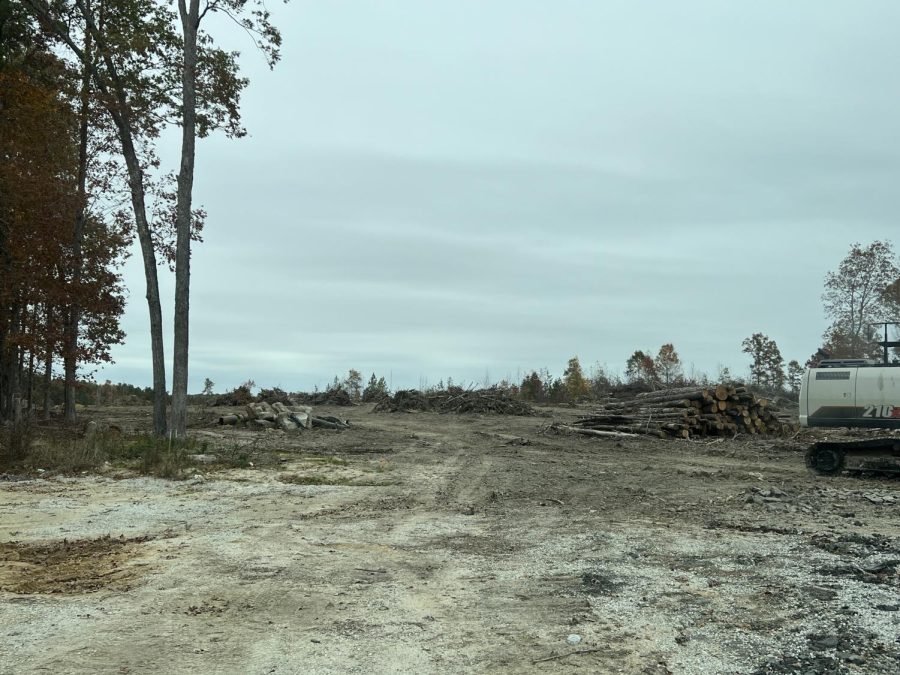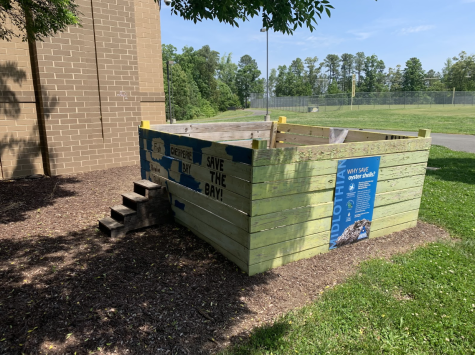Con: Genito development destroys essential ecosystems
Construction on the new water park has resulted in the destruction of trees.
The waterpark currently in construction near Clover Hill High School by Chesterfield County and Flatwater Cos. is an example of the careless and irresponsible decisions the government is making with the life, land and resources under its power.
Ecosystems, like the forest being cleared for waterpark construction, are becoming more precious every day. They are constantly cleared for construction and agriculture, and the fragments that remain struggle to provide the services we depend on, such as food production.
Forests are essential to our planet. The trees pull carbon dioxide out of the air to build their trunks while creating soil rich in organic matter that holds even more carbon in the ground.
Fungi pull this carbon deep into the earth, continually storing it where it can not escape until disturbed. All of this helps to slow and mitigate climate change.
The soil in a healthy forest is naturally loose and sponge-like. It soaks in whatever water hits it and stores that water until plants use it.
The shade of the trees and the leaf litter prevents the sun from heating the soil, cooling the planet and preventing water from evaporating. This prevents both floods and droughts: water doesn’t pool because it soaks into the ground, and the earth doesn’t dry because large amounts of water are stored and do not evaporate.
The dense, interconnected root systems of trees and the coat of leaves over the soil in a forest also prevent erosion by holding the soil in place.
Michelle Huber, who teaches AP Environmental Science, believes the future waterpark will be detrimental to our local environment.
“With [a] rainstorm, we might see soil trailing down Genito, that might be something to look for, and then that gets into the water system by the stormwater drain,” Huber said. “And that turbidity, that cloudiness in the water affects living organisms. It [also] impacts air quality, as far as, not only sediment being kicked up in dust, but also fossil fuel burning [from] heavy equipment.”
Plants and microbes in the soil also have the ability to filter many pollutants from the water before it reaches lakes or groundwater reservoirs. When it hits hard surfaces like pavement, rainwater picks up toxic chemicals and runs into larger bodies of water, damaging the ecosystem and polluting our drinking water.
Forests are home to countless species. Among these are important pollinators, like bumblebees and hummingbirds, many of which are declining rapidly and need large areas of natural ecosystems to search for nectar. These animals are essential to allow flowering plants to reproduce, including the majority of our food and many native wildflowers, shrubs and trees that are key parts of the ecosystem.
Deer, frogs, countless bird species and a wide array of other animals, most of which are declining, need as much habitat as they can get to keep from going extinct. Each one of the uncountable species in the forest is important.
Huber believes that healthy ecosystems are valuable because of the variety of species in them.
“It’s all based on biodiversity,” Huber said. “If we have just a monoculture, one organism, one species, and it gets wiped out then you have nothing to fall back on, there’s no other species to move in and take its place, take its niche. When we remove a certain species, one, they potentially go extinct, and two, we don’t know all the reasons for each species. So as we go into something we don’t always know the impacts, or the effects, that removal of a species, removal of anything is gonna cause.”
Every patch of forest that gets cut down pushes an unknown number of species closer to extinction. Everything that makes forests vital to Earth – their ability to sequester carbon, stabilize the climate, control droughts and floods, prevent erosion, remove contaminants from groundwater and house tens of thousands of species – is done best by the old-growth forests.
As a forest ages, the trees grow massive and are able to pull huge amounts of carbon from the air, the soil grows rich and absorbs more water and the ecosystem grows more complex. The microorganisms that form symbiotic relationships with trees, filter water and store carbon deep in the soil thrive by feeding on the thick layer of plant matter that accumulates on the ground. All of this takes hundreds of years to develop to the point where it truly has a large impact. Deforestation cannot be justified by simply planting more trees when they have been cut down and expecting something that took hundreds of years to form to be replaced in a few decades.
The construction of a single mixed-use development is not the end of the world, but it is part of a pattern that certainly could be. Chesterfield County was doing fine without a waterpark. It was not worth the cost of destroying a part of an irreplaceable and essential ecosystem.
Many of the resources people depend on are rapidly disappearing, and the last thing the government needs to do is accelerate that. These are real issues with real consequences, and it is essential to see and act on them before it is too late.
While some may disagree, Chesterfield County is irresponsible for approving and funding this waterpark project when it could be protecting our remaining forests before they all suffer the same fate in the face of inefficient and unnecessary development.
Genito water park development promises changes, opportunities for community

Hazel Lair is in their third year of writing for the Cavalier Chronicle. They focus on the plants and animals that live around the school and on the greater...













rylie • Nov 29, 2022 at 3:48 pm
this is correct i dont think they should build a water park there it destroys the ecosystem
Mi Teionna Warren • Nov 22, 2022 at 10:51 am
I love how detail, specific the article is. It’s very entertaining in my opinion.
Everett • Nov 22, 2022 at 10:20 am
I think you are correct. Though one water park wouldn’t have to much of an effect on Chesterfield nor the state, the pattern it follows is alarming. The pattern of paving away natural and necessary environments for corporate profit is a great mistake and a problem that our society has. Personally, I think that governments, state and local, should recognize the threat of over population and along with that, mass industrialization, which are catastrophic.
Edward • Nov 15, 2022 at 10:12 am
I can agree wit this, it takes only a few days to get rid of the forest, but it takes decades to restore it back to what it was before. But, they could place trees back around it, to try & help the area around it, & they can use the correct safety measurements to limit damage to the environment around the waterpark.